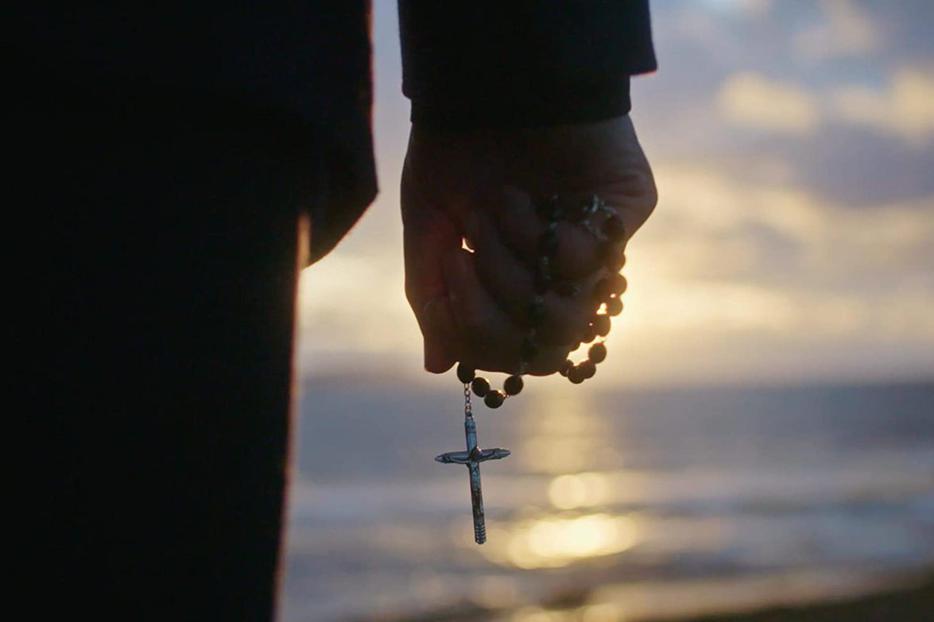Father Peyton’s Prayerful, Rosary-Focused Mission Is Chronicled in ‘Pray,’ the Movie About His Life and Legacy
FILM REVIEW

One of the two great pioneers spreading the faith in the 20th century through the media of radio and television was Father Patrick Peyton of the Congregation of the Holy Cross. Nothing seemed beyond the ability of this simple Irish priest when it came to spreading the message of the Rosary and family prayer, first over national radio and then on television. Those efforts made way for his international Rosary rallies that drew phenomenal multitudes.
Today, as Venerable Father Patrick Peyton’s cause travels toward canonization, the media of movies is taking its turn to tell his inspiring story in the documentary film titled Pray: The Story of Patrick Peyton, by Family Theater Productions.
This film account of the life of “The Rosary Priest” moves along, perfectly paced from jaunty to reflective, with interviews, a few brief dramatizations to recall his early years, and plenty of footage of Father Peyton himself from his personal appearances at mega rallies that at times drew up to 2 million people. Add to this numerous still images with his own voice-overs or narration.
“You really cannot make it up — it’s as a simple as that.” So proclaims an interviewee from an Irish cultural center at the beginning of the film, as the story begins chronologically with Peyton as a boy in his native Ireland.
“My father would lead us in the Holy Rosary,” Father Peyton tells the audience in heartfelt narration. His father living his beliefs “left an impression on me as a child that nothing could erase.” Approaching the story with this technique to share such important insights gives viewers a firm foundation in understanding Father Peyton. Using his own reminiscences in his own voice makes this story genuine, with the audience hearing the true emotional tone of the subject himself.
Father Peyton proclaims in the simplest language, yet with great depth, the importance and necessity of praying the Rosary and praying as a family and living as a domestic church. His message came directly from his heart and lived beliefs. The way he speaks reveals his genuineness, his love, his saintliness.
Via Media
Father Peyton saw media as the highway to reach souls, invoking Hollywood’s biggest star at the time to appear on his first radio show over the second largest radio network in the nation. Father Peyton asked Bing Crosby to join him for that first broadcast on Mother’s Day, May 13, 1945. That was the beginning of many radio shows and led to the creation of Family Theater Productions and a regular TV series.
Among scores of top names in the industry who willingly appeared because of his message and sincerity were Maureen O’Hara, Jimmy Stewart, Loretta Young, Jack Benny, Lucille Ball, Bob Hope, Shirley Temple and Gregory Peck.
The film includes a segment where Frank Sinatra talks about Father Peyton “as the man who has dedicated his life to that image (the Holy Family),” and another on-set slice highlights Ann Blyth and Bing Crosby readying to film at Family Theater. Segments like this pay homage to Father Peyton’s pioneering in media.
Such segments are bolstered by the filmmakers’ choices of those interviewed. Among them are insights from Peyton relatives, including his niece and nephews — one of whom is a priest in Ireland whose name is Father Pat Peyton! Insights are also provided from those who carry on Father Peyton’s legacy, such as Holy Cross Fathers Willy Raymond and David Guffey, the former and current directors of Family Theater Productions.
With Father Peyton’s constant emphasis and focus on family prayer, it is apropos that pro-baseball player Mike Sweeney and his wife, Shara, make an appearance in the film. The Sweeneys explain the influence of Father Peyton’s message and the effects praying the Rosary together every night have had on their marriage and family. To emphasize such spiritual successes, the filmmakers talk with other married couples and families who have been impacted by Father Peyton’s prayerful message.
Pray’s beautiful use of camera work and editing allows the story to flow smoothly, with its seamless mixture of original film footage, photos, a few reenactments and interviews.
Rosary Missionary
During Father Peyton’s first assignment in Albany, New York, shortly after his ordination in 1941, he set a goal, asking the Lord to get 10 million American families praying the Rosary together to save marriages, families and children. While we’ll never know this side of heaven the exact number his prayer endeavor achieved, the film reveals an impressive array of prayer-focused accomplishments.
The viewer has a front-row seat to it all, including film clips of some of Father Peyton’s rallies. Here is where the visuals and the words of Father Peyton really draw viewers into the story’s power via film. Speaking “full of passion and drama” and pleading directly to hearts, he drew 500,000 people to his rally in San Francisco, the largest crowd in the city’s history. Then 2 million gathered to hear him in Sao Paolo, Brazil. The city had to shut down due to the large crowds.
More amazing images are shown from his rally in Manila, a trip made even though doctors told Father Peyton not to make the trip because of his ill health. Original footage shows him drawing another 2 million for that family Rosary crusade on Dec. 8, 1955.
This film is not a dry biography, but an exciting story of a life touching countless others. The message of Pray hits the mark as viewers see these tremendous crowds Father Peyton drew and hear from individual families how their lives changed.
As Father Peyton put it himself, “I’m for everything that ennobles man and exalts women and children. First of all, I’m for prayer, family prayer.”
Amen!
WATCH
PRAY: The Story of Patrick Peyton is scheduled to open in select theaters on Oct. 9.
















